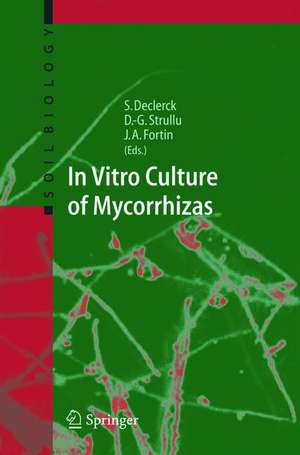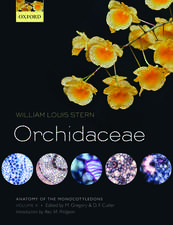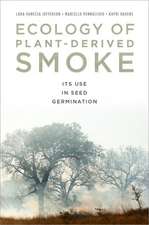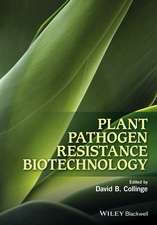In Vitro Culture of Mycorrhizas: Soil Biology, cartea 4
Editat de Stéphane Declerck, Désiré-Georges Strullu, André Fortinen Limba Engleză Hardback – 13 apr 2005
| Toate formatele și edițiile | Preț | Express |
|---|---|---|
| Paperback (1) | 1707.20 lei 6-8 săpt. | |
| Springer Berlin, Heidelberg – 22 oct 2010 | 1707.20 lei 6-8 săpt. | |
| Hardback (1) | 1711.45 lei 6-8 săpt. | |
| Springer Berlin, Heidelberg – 13 apr 2005 | 1711.45 lei 6-8 săpt. |
Din seria Soil Biology
- 18%
 Preț: 958.56 lei
Preț: 958.56 lei - 18%
 Preț: 1225.62 lei
Preț: 1225.62 lei - 18%
 Preț: 957.75 lei
Preț: 957.75 lei - 18%
 Preț: 1232.09 lei
Preț: 1232.09 lei - 18%
 Preț: 949.90 lei
Preț: 949.90 lei - 18%
 Preț: 1392.95 lei
Preț: 1392.95 lei - 18%
 Preț: 952.26 lei
Preț: 952.26 lei - 18%
 Preț: 1231.32 lei
Preț: 1231.32 lei - 18%
 Preț: 956.03 lei
Preț: 956.03 lei - 18%
 Preț: 948.29 lei
Preț: 948.29 lei - 18%
 Preț: 1224.18 lei
Preț: 1224.18 lei - 18%
 Preț: 1226.90 lei
Preț: 1226.90 lei - 18%
 Preț: 952.26 lei
Preț: 952.26 lei - 18%
 Preț: 942.63 lei
Preț: 942.63 lei - 18%
 Preț: 946.55 lei
Preț: 946.55 lei - 18%
 Preț: 1221.20 lei
Preț: 1221.20 lei - 18%
 Preț: 1225.94 lei
Preț: 1225.94 lei - 18%
 Preț: 946.24 lei
Preț: 946.24 lei - 24%
 Preț: 1051.29 lei
Preț: 1051.29 lei - 18%
 Preț: 1221.02 lei
Preț: 1221.02 lei - 18%
 Preț: 947.98 lei
Preț: 947.98 lei - 18%
 Preț: 948.47 lei
Preț: 948.47 lei - 18%
 Preț: 1222.31 lei
Preț: 1222.31 lei - 18%
 Preț: 1231.64 lei
Preț: 1231.64 lei - 18%
 Preț: 1225.31 lei
Preț: 1225.31 lei - 18%
 Preț: 1229.73 lei
Preț: 1229.73 lei
Preț: 1711.45 lei
Preț vechi: 2087.13 lei
-18% Nou
Puncte Express: 2567
Preț estimativ în valută:
327.48€ • 356.84$ • 275.95£
327.48€ • 356.84$ • 275.95£
Carte tipărită la comandă
Livrare economică 23 aprilie-07 mai
Preluare comenzi: 021 569.72.76
Specificații
ISBN-13: 9783540240273
ISBN-10: 3540240276
Pagini: 416
Ilustrații: XXIV, 392 p.
Dimensiuni: 155 x 235 x 31 mm
Greutate: 0.7 kg
Ediția:2005
Editura: Springer Berlin, Heidelberg
Colecția Springer
Seria Soil Biology
Locul publicării:Berlin, Heidelberg, Germany
ISBN-10: 3540240276
Pagini: 416
Ilustrații: XXIV, 392 p.
Dimensiuni: 155 x 235 x 31 mm
Greutate: 0.7 kg
Ediția:2005
Editura: Springer Berlin, Heidelberg
Colecția Springer
Seria Soil Biology
Locul publicării:Berlin, Heidelberg, Germany
Public țintă
ResearchCuprins
State of the Art.- In Vitro Culture of Mycorrhizas.- Systematics.- The Monoxenic Culture of Arbuscular Mycorrhizal Fungi as a Tool for Germplasm Collections.- The Monoxenic Culture of Arbuscular Mycorrhizal Fungi as a Tool for Systematics and Biodiversity.- Life Cycle of Glomus Species in Monoxenic Culture.- Life History Strategies in Gigasporaceae: Insight from Monoxenic Culture.- In Vitro Development and Physiology of Glomeromycetes.- Environmental Factors That Affect Presymbiotic Hyphal Growth and Branching of Arbuscular Mycorrhizal Fungi.- Breaking Myths on Arbuscular Mycorrhizas in Vitro Biology.- Host and Non-Host Impact on the Physiology of the AM Symbiosis.- Carbon Metabolism, Lipid Composition and Metabolism in Arbuscular Mycorrhizal Fungi.- Monoxenic Culture as a Tool to Study the Effect of the Arbuscular Mycorrhizal Symbiosis on the Physiology of Micropropagated Plantlets in Vitro and ex Vitro.- Uptake, Assimilation and Translocation of Mineral Elements in Monoxenic Cultivation Systems.- Interaction of Arbuscular Mycorrhizal Fungi with Soil-Borne Pathogens and Non-Pathogenic Rhizosphere Micro-Organisms.- Root Organ Culture of Ectomycorrhizal Fungi.- Cistus incanus Root Organ Cultures: a Valuable Tool for Studying Mycorrhizal Associations.- Cultivation of Edible Ectomycorrhizal Fungi by in Vitro Mycorrhizal Synthesis.- Root Organ Culture of Other Fungal Symbioses.- Geosiphon pyriformis—a Glomeromycotan Soil Fungus Forming Endosymbiosis with Cyanobacteria.- Sebacinaceae: Culturable Mycorrhiza-Like Endosymbiotic Fungi and Their Interaction with Non-Transformed and Transformed Roots.- Biotechnology.- Large-Scale Inoculum Production of Arbuscular Mycorrhizal Fungi on Root Organs and Inoculation Strategies.- Methodology.- Methodologies for in Vitro Cultivation ofArbuscular Mycorrhizal Fungi with Root Organs.
Recenzii
From the reviews:
"There is no doubt that this book will interest not only mycorrhizologists, but also more generally, researchers working with obligate plant biotropic microorganisms recalcitrant to axenic culture in the absence of host roots. This volume of the Soil Biology series compiles experts’ advice and know-how in the use of in vitro cultivation methods in AM symbiosis research. … this book will be useful to researchers envisaging in vitro system for conservation, production, and studies of mycorrhizal fungi." (Ghislaine Recorbet, Mycorrhiza, 2006)
"Arbuscular mycorrhizal fungi (AMF) form an extremely important group of soil fungi. … This book, edited by three well-known experts in the field, gives an overview of the technology and reviews results obtained so far. … This is the book that I would have seen written. … strikes a good balance between optimism about the successes in store for the novel methodology and a critical attitude towards the methodology. The book will certainly be a very welcome addition to libraries … ." (Thomas W. Kuyper, Mycopathologia, Vol. 162, 2006)
"The Editors clearly explain how the obligate nature of AM fungi makes it difficult to study most aspects of their biology, and how the use of root-organ-cultures (ROCs) has opened new opportunities and vistas on several aspects of the AM symbiosis. … The book is very interesting and worth considering as a reference manual … ." (Paola Bonfante, Mycological Research, Vol. 110, 2006)
"There is no doubt that this book will interest not only mycorrhizologists, but also more generally, researchers working with obligate plant biotropic microorganisms recalcitrant to axenic culture in the absence of host roots. This volume of the Soil Biology series compiles experts’ advice and know-how in the use of in vitro cultivation methods in AM symbiosis research. … this book will be useful to researchers envisaging in vitro system for conservation, production, and studies of mycorrhizal fungi." (Ghislaine Recorbet, Mycorrhiza, 2006)
"Arbuscular mycorrhizal fungi (AMF) form an extremely important group of soil fungi. … This book, edited by three well-known experts in the field, gives an overview of the technology and reviews results obtained so far. … This is the book that I would have seen written. … strikes a good balance between optimism about the successes in store for the novel methodology and a critical attitude towards the methodology. The book will certainly be a very welcome addition to libraries … ." (Thomas W. Kuyper, Mycopathologia, Vol. 162, 2006)
"The Editors clearly explain how the obligate nature of AM fungi makes it difficult to study most aspects of their biology, and how the use of root-organ-cultures (ROCs) has opened new opportunities and vistas on several aspects of the AM symbiosis. … The book is very interesting and worth considering as a reference manual … ." (Paola Bonfante, Mycological Research, Vol. 110, 2006)
Notă biografică
This is the first book describing in vitro cultivation of root organs. The text describes various biological aspects such as the physiology, biochemistry, biodiversity, and life cycles of fungi, as well as the effects of symbiosis on plant growth and development, including large-scale fungus production for biotechnological use. Detailed protocols allow the immediate application of the method to culture mycorrhizal fungi in vitro.
Caracteristici
Presents a new method of root organ culture, which allows to study plant-fungi symbiosis Provides latest applications and results contributed by leading authorities in the field Includes detailed protocols which allow newcomers also to immediately apply the culture techniques Includes supplementary material: sn.pub/extras






